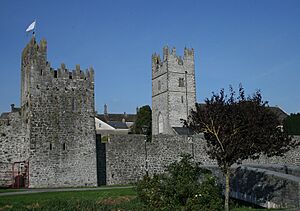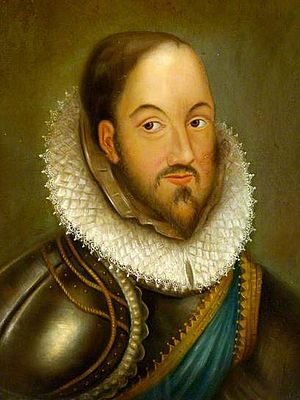John Everard (MP) facts for kids
Sir John Everard (around 1550 – 1624) was an important Irish lawyer, politician, and judge. He was special because he was the last Irish judge for a long time who openly said he was Roman Catholic. Because of his faith, he had to leave his job as a judge in 1607.
After that, he became a politician and was part of the Irish Parliament from 1613 to 1615. Catholic members of Parliament chose him to be the Speaker, which is like the leader of the House of Commons. They even put him in the Speaker's chair! However, King James I had created new voting areas called pocket boroughs, which gave Protestants more power. So, the Protestants chose Sir John Davies as Speaker instead. In a very funny and embarrassing moment, Everard first refused to leave the chair until Sir John Davies actually sat on him! This made Everard lose favour for a while, but he later got back into the King's good graces. His second son, Sir Richard Everard, became the first of the Everard baronets, a special title of honour.
Contents
Early Life and Legal Career
Sir John Everard grew up in Fethard, County Tipperary, a town in Ireland. He was the oldest son of Sir Redmond Everard, whose family was Catholic and practically owned the town of Fethard. We don't know much about his mother.
In 1578, he began studying law at the Inner Temple in London. After a long time, he officially became a lawyer in 1590. Some people think he didn't plan to be a lawyer at first, but changed his mind when he had a family to support. Even so, he quickly became known as a very smart lawyer. He worked for important people like the Earl of Ormond from the powerful Butler dynasty. He was also often asked to help settle disagreements between people.
He joined the King's Inns, which is a place for lawyers in Ireland. He had his own office there. At first, he and another important lawyer, Sir John Elliott, were allowed to have their sons stay with them at the Inns, but this rule later changed.
Becoming a Judge
In 1602, John Everard was made a judge in the Court of King's Bench in Ireland. He was also given the title of Knight. He often worked in the Court of Castle Chamber, which was like a special court in Ireland. He regularly traveled to places like Meath, Louth, and Kilkenny to hear court cases.
Challenges as a Catholic Judge
Many Irish judges were secretly Catholic, but Sir John Everard was different because he openly said he was Catholic. His brother James even became a Jesuit, a Catholic priest. This made the Crown, especially the Lord Deputy of Ireland, Sir Arthur Chichester, very unhappy. Chichester was a strong Protestant and strictly enforced laws against Catholics, even executing Catholic bishops.
However, most people liked and respected Everard, even Chichester himself. For a while, Everard was allowed to keep his job because it was hard to find someone suitable to replace him. But eventually, his position became impossible, and he had to resign in 1607. He received a good pension, which was money paid regularly after he left his job. He also got the job of chief judge for the special court in Tipperary. This court was run by the Earl of Ormond, who had special powers in the county. This new job was mostly an honorary title, meaning it didn't involve much work.
Everard remained a member of the King's Inns and became a senior member in 1609.
Improving His Hometown
Sir John Everard was like the owner of the town of Fethard, and he worked hard to make it better. He helped design the main street and built the Tholsel, which was the town hall. He also owned a lot of land in Tipperary and County Waterford. Even though some people accused him of unfair land deals, he was also known for his kindness and charity. In 1611, he received a special permission from the King to build two almshouses in Fethard. Almshouses were places where poor or elderly people could live.
Political Life and Speaker Controversy
In 1613, the only Irish Parliament during the reign of King James I was called. Sir John Everard was chosen to represent County Tipperary in the House of Commons. His father had represented the same area before.
The Catholic members of Parliament, who were a large group, wanted Everard to be their Speaker. But Lord Deputy Chichester wanted his own trusted man, Sir John Davies, who was the chief lawyer for Ireland, to be Speaker.
The Catholic members, led by Thomas Luttrell, said that Everard had been elected, and he took the Speaker's chair. Then things got a bit silly! The government said Davies had been elected. Everard, who was usually very sensible, refused to leave the chair until Davies, who was a very large man, actually sat on him! Everard and his supporters then left in protest.
Because of this, Everard was called to England. He tried to explain the Catholic Members' side but was put in the Tower of London and removed from the King's Inns. However, he was soon set free. When he returned to Ireland, he told the Catholic community to be calm, but he kept pushing in Parliament for more freedom for Catholics. Despite the embarrassing Speaker incident, he was very active in the Parliament from 1613 to 1615.
Surprisingly, Lord Deputy Chichester asked for Everard to be allowed back into the King's Inns. Even though they had different religious views, the two men had become friends and business partners. Chichester wrote to the King's Inns, praising Everard's good behaviour in Parliament and saying that a man "so worthy in everything except religion" should be allowed back. The King's Inns agreed, though maybe not with much enthusiasm. One of his fellow lawyers, Sir Christopher Sibthorpe, was a strong Protestant who spoke out against Catholics. But Everard and Sibthorpe seemed to avoid open arguments. Sibthorpe, however, was one of those who didn't want Catholics to be lawyers.
Later Years and Family
After Chichester left his job as Lord Deputy in 1616, Everard felt brave enough to write to the English Crown. He asked them to relax the laws against Catholics and allow them to become lawyers. But his hopes for change were quickly crushed. Chichester's replacement, Oliver St John, 1st Viscount Grandison, continued to persecute Catholics, especially priests.
Even so, the Crown still thought highly of Everard. He received special permissions, like the right to hold fairs and markets. However, his religion stopped him from having a big role in public life. He continued to manage the business affairs of the powerful Ormonde family. For unknown reasons, he was briefly put in prison in 1620. In the same year, he gave a lot of his land to his second son, Richard, who became a Baronet two years later.
In his final years, he was friends with the very powerful Anglo-Irish nobleman, Richard Boyle, 1st Earl of Cork. They did several business deals together, and Everard hosted the Earl of Cork at his home shortly before he died in 1624.
Family Life
Sir John Everard married Catherine Comerford. She was the daughter of Fulke Comerford and Rosina Rothe, and the sister of his fellow judge, Gerald Comerford. Catherine likely died before 1624 because she wasn't mentioned in her husband's will.
John and Catherine had at least four sons:
- Nicholas, who also became a lawyer. He was allowed to share his father's office at the King's Inns.
- Richard, who became a Baronet during his father's lifetime. He was an important member of Confederate Ireland, a group of Irish Catholics. He was sentenced to death by the winning forces in 1651 but was saved and died in prison around 1660.
- Gilbert.
- John.
They also had a daughter whose name isn't known, who married Henry White fitzWhite.
Images for kids
 | Sharif Bey |
 | Hale Woodruff |
 | Richmond Barthé |
 | Purvis Young |





